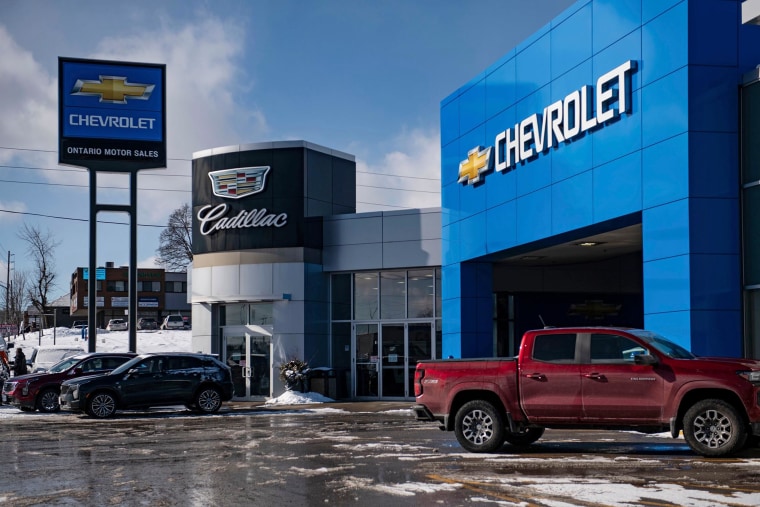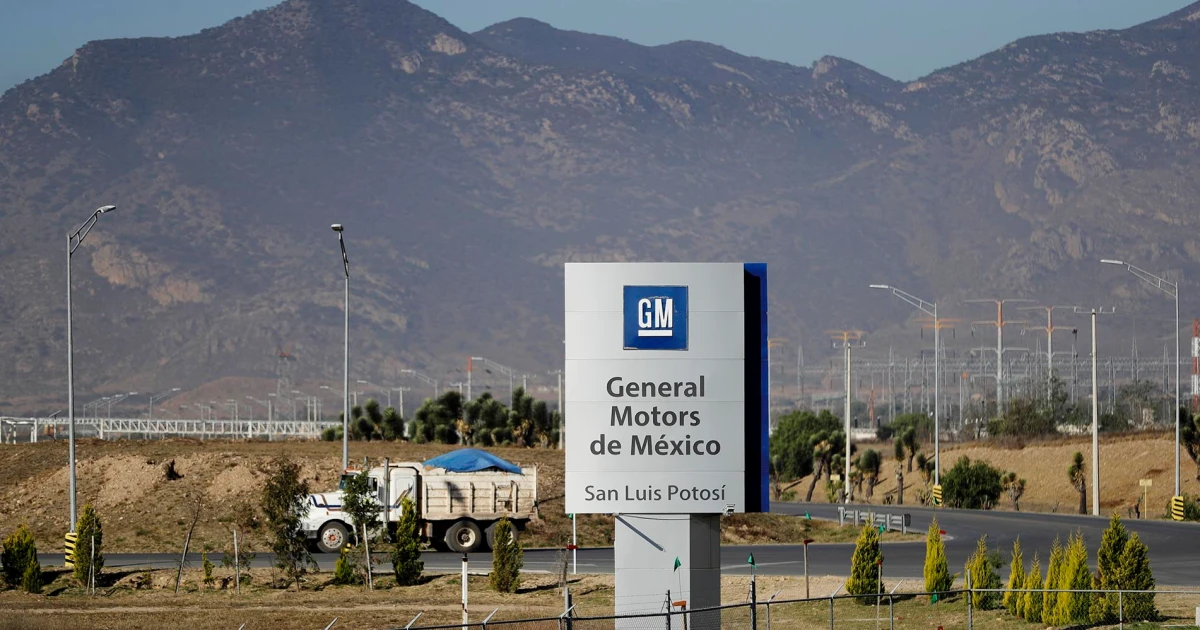General Motors shares fell more than 7% Thursday as investors weighed the auto giant’s outsize vulnerability to the tariffs President Donald Trump announced Wednesday.
Among major U.S. automakers, GM has the most extensive operations in Mexico and Canada, which would take a direct hit from the president’s latest import taxes on vehicles and auto parts made abroad. The Chevy Silverado is produced by both of America’s immediate neighbors, while the Chevy Equinox and GMC Terrain are manufactured in Mexico. The Chevy Trax compact SUV, meanwhile, comes from South Korea.
“Tesla and Ford appear to be the most shielded [from tariff impacts] given location of vehicle assembly facilities although Ford does face incremental exposure on imported engines,” Deutsche Bank analysts wrote in a note Thursday. “GM has the most exposure to Mexico.”
Trump administration officials suggested there would be a temporary carveout for vehicles and parts that complied with the U.S.-Mexico-Canada free-trade agreement, but said how that would end up working was still being determined. At least one analyst suggested any auto tariffs that impacted Mexico and Canada would violate the agreement, which Trump negotiated during his first term.
The new levies come just as the car industry notches the highest first-quarter new-vehicle sales in the U.S. since 2021, Edmunds analysts said Thursday, with strong demand in March contributing to a 1% jump from the same period a year ago. But analysts now say that trend could be in peril.
“With nearly half of all vehicles sold being assembled outside of the U.S., we anticipate major repercussions from tariffs at any level,” said Ivan Drury, director of insights at Edmunds.
Goldman Sachs estimated the 25% duties could drive up sticker prices by anywhere from $5,000 to $15,000 per imported vehicle and by $3,000 to $8,000 for domestically made ones.
Automakers appear to be treading cautiously with their public remarks on the policy change.
“U.S. automakers are committed to President Trump’s vision of increasing automotive production and jobs in the U.S. and will continue to work with the Administration on durable policies that help Americans,” Matt Blunt, president of the American Automotive Policy Council, said in a statement following the announcement. “It is critical that tariffs are implemented in a way that avoids raising prices for consumers.”
But Ford CEO Jim Farley was far less sanguine last month, saying at an investment conference that 25% tariffs would be “devastating” and would “blow a hole in the U.S. industry that we’ve never seen.”
Speaking at the same conference, GM executives signaled they were prepared to weather as much as 50% of the impact from any new tariffs.
“When we know exactly what’s going to happen, and/or even have an indication of what’s going to happen, we know the steps we could take,” CEO Mary Barra said at the time. The company indicated it could take further steps to blunt the effects from long-lasting trade policies, including by shifting production.

A General Motors dealership in Oshawa, Ontario.Galit Rodan / Bloomberg via Getty Images file
But on Thursday the president emphasized that his new auto tariffs would be “permanent.” He has said they’ll bring more auto production back to the U.S. and generate vast revenues for government coffers, ballparking those proceeds at up to $100 billion without providing details behind that estimate.
Shares in Tesla surged as much as 4% Thursday, even as CEO Elon Musk said in an X post that the duties would “affect the price of parts in Tesla cars that come from other countries.”
“The cost impact is not trivial,” he added.
However, analysts have concluded that Tesla is among the least-exposed overall to the duties. As early as Sunday, March 23, Tesla itself was posting that its cars were “the most American-made.”
In his Wednesday remarks from the Oval Office, Trump asserted that Musk was not consulted about the duties.
While automakers could each feel the impacts differently, the whipsawing White House trade policies are destabilizing for the entire industry, experts say.
“What we’ve seen so far in this is an announcement and then a change, and then an announcement and then a change,” Stephanie Brinley, automotive analyst at S&P Global Mobility, said Wednesday evening. “I don’t know that anybody’s breathing a sigh of relief.”
For automakers, she said, “the situation is still incredibly complicated and the decisions are complex, and the tariffs that were announced are one portion of a lot of things that go into global sourcing decisions.” One silver lining, she added, is that “if this settles it down, and this is what the tariff is, instead of back-and-forth at least you have an answer.”
Drury said the ripple effects from tariffs could be felt far beyond industry C-suites and dealership lots.
“Automakers have huge investments to make, and the language of these tariffs could upend plans that were years in the making. The automotive industry also has long-term and deep-reaching impacts within any community that receives these investments,” he said. “People’s whole lives are on the line, and even if someone doesn’t work on an assembly line, they will know someone who does.”
While industry experts and automakers brace for fallout, the nation’s top autoworker union hailed the tariffs.
“We applaud the Trump administration for stepping up to end the free trade disaster that has devastated working-class communities for decades,” United Auto Workers President Shawn Fain said in a statement Wednesday. “Ending the race to the bottom in the auto industry starts with fixing our broken trade deals, and the Trump administration has made history with today’s actions.”
The union had endorsed Trump’s rival in last year’s election, Democratic Vice President Kamala Harris, with Fain having slammed Trump as a “scab” standing against labor. UAW leaders at the local level, meanwhile, continue to voice concerns about White House trade policies.
So far, major announcements of new auto production facilities continue to mount, though not in areas where the UAW has traditionally prevailed. A recent list of new electric vehicle plants highlighted by Automotive Dive showed just one such facility in the Midwest, with the rest dispersed throughout the South — a region with fewer labor protections and a deep base of Trump voters.
Steve Kopack contributed.



